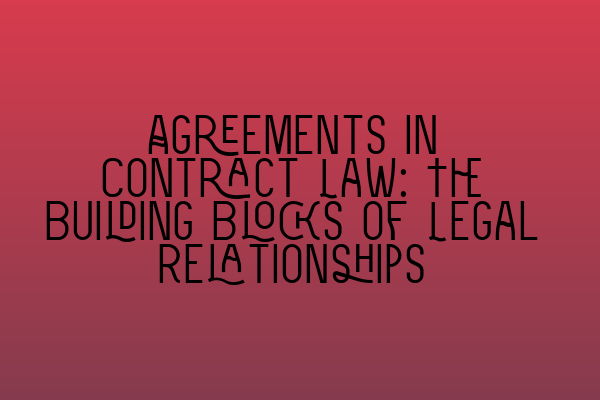Agreements in Contract Law: The Building Blocks of Legal Relationships
In the world of contract law, agreements serve as the cornerstone of legal relationships. These agreements, whether written or verbal, establish the rights and obligations of the parties involved. A thorough understanding of the elements and significance of agreements is essential for solicitors, as they navigate the intricacies of contract law and advocate for their clients.
So, what exactly is an agreement in contract law? An agreement is a meeting of the minds between two or more parties, where they come to a mutual understanding about the terms and conditions of their contractual relationship. This understanding can be reached through various means, such as negotiations, offers, acceptances, and counteroffers.
Before we delve into the intricacies of agreements, it’s important to note that not all agreements are legally binding. In order for an agreement to be enforceable in a court of law, certain elements must be present. These elements include offer, acceptance, consideration, intention to create legal relations, and certainty of terms. Each of these elements plays a vital role in determining the validity and enforceability of an agreement.
Let’s start with the first element: offer. An offer is a proposal made by one party to another, indicating a willingness to enter into a contract on specific terms. It is important to distinguish an offer from mere invitations to treat, which are preliminary negotiations and not binding. An offer must be clear, definite, and communicated to the other party to be considered valid.
Once an offer has been made, the next element to consider is acceptance. Acceptance is the manifestation of agreement to the terms of the offer. It must be unconditional and communicated to the offeror. It is important to note that acceptance must mirror the terms of the offer, any deviation may constitute a counteroffer, which requires the original offeror’s acceptance to be binding.
Consideration is another crucial element of an enforceable agreement. Consideration refers to something of value given by each party to the other. It can be in the form of money, goods, services, promises to do or not to do something, or even forbearance. Consideration ensures that each party to the agreement is giving and receiving something of value in return.
In addition to offer, acceptance, and consideration, the intention to create legal relations is fundamental. This element establishes whether the parties intended their agreement to be legally binding. While some agreements, like social or domestic arrangements, may not have the intention to create legal relations, commercial agreements are often presumed to have such an intention.
Finally, an agreement must have certainty of terms. This means that the terms of the agreement must be clear, sufficiently defined, and not vague or uncertain. If the terms are too uncertain, the agreement may be void for uncertainty.
Understanding these elements is crucial for solicitors as they advise their clients on contract negotiations, draft contracts, and represent them in dispute resolution. By ensuring that these elements are present and adequately addressed, solicitors can help their clients create legally binding and enforceable agreements that protect their interests.
In conclusion, agreements are the building blocks of legal relationships in contract law. Understanding the elements of offers, acceptances, considerations, intention to create legal relations, and certainty of terms is essential for solicitors to effectively navigate the complexities of contract law and advocate for their clients. By mastering the intricacies of agreements, solicitors can ensure that their clients’ contractual rights and obligations are protected.
For more information and resources on SQE Contract Law, be sure to check out the following related articles:
– SQE 1 Practice Exam Questions
– SQE 1 Practice Mocks FLK1 FLK2
– SQE 2 Preparation Courses
– SQE 1 Preparation Courses
– SRA SQE Exam Dates
These resources will provide you with further guidance and support as you navigate the world of SQE Contract Law and prepare for your upcoming exams.
